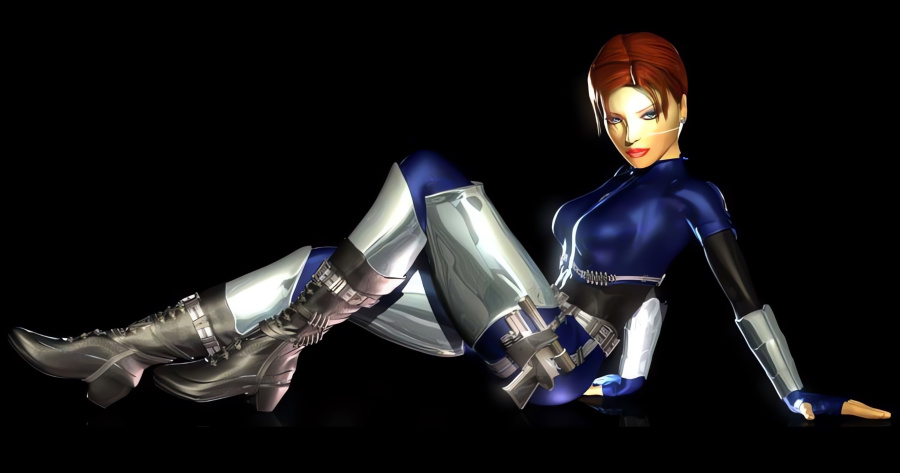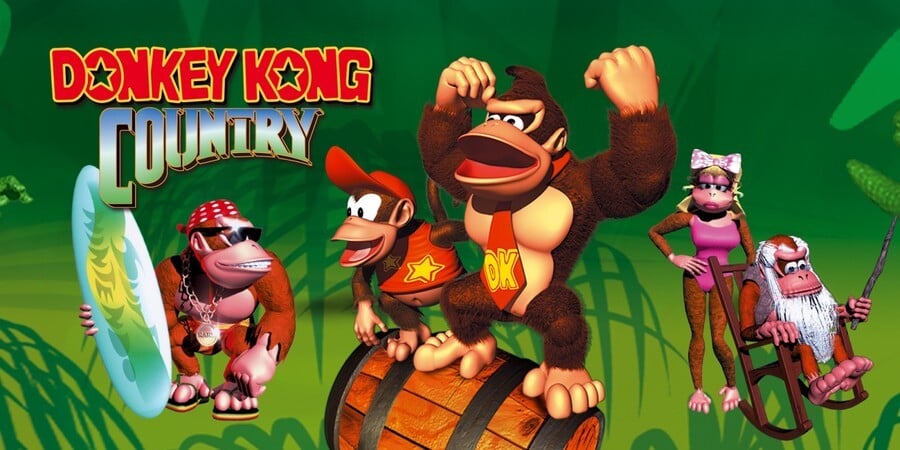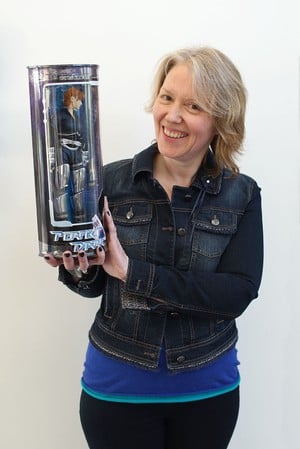
While many fans of the legendary British developer Rare fawn over the likes of David Wise and Grant Kirkhope, a name that rarely ever comes up is Eveline Novakovic. However, after co-composing two of the Donkey Kong Country games and lending her talents to many other Rare titles, Novakovic shouldn’t be forgotten. In fact, her story as someone with no experience with gaming or programming that fell into one of the most adored video game developers of all time, but still excelled through sheer force of will deserves to be told. This is the tale of Rare’s unsung virtuoso, Eveline Novakovic.
Some kids dread music lessons, but Novakovic (whose maiden name is Eveline Fischer) wasn’t one of them. She happily spent her formative years learning the piano, violin, and church organ. Even from a young age, she adored everything about music, from the electrifying buzz of performing awe-inspiring works alongside others to its magical ability to sweep one away from the mundane and into the realm of fantasy. When she wasn’t playing herself, she listened to anything from swinging big band jazz and soulful blues to classical choral, ballet, and theatre music. Novakovic's horizons grew even broader during her university years, where her musical studies went as far back as the Gregorian chants of the Middle Ages to modern 20th-century tunes.
After graduating from Newcastle University with a Master’s degree in Medieval music, Novakovic was approached by a neighbour named Stephen Deutsch. Stephen, an accomplished composer himself, invited her to join his new postgraduate program on "Electro-Acoustic Music for Film and Television" at Bournemouth University. It was radically different from anything Novakovic had ever studied before, which is precisely what made it such an exciting proposition – one she quickly accepted.
Some of her most influential coursework came from dissecting how soundtracks impacted a film’s narrative and the audience’s perception of it. While all of the various musical genres she listened to inspired her in some way or another, nothing fascinated her as much as the art of storytelling through music at the heart of the best film scores. "The original Klaus Doldinger soundtrack for the [1981] film Das Boot with its heavy use of sound, Alan Silvestri’s chilling score for the thriller Shattered, and [the soundtrack for] Frances Ford Coppola’s Apocalypse Now all had elements that defined the way I would later approach writing music for gaming," Novakovic tells us.

However, Novakovic never intended to work in the video game industry. After all, her studies revolved around film and television and she never really played games herself, anyway. Nevertheless, at the end of the program, she happened upon a job listing from Rare looking for an in-house musician. Despite her lack of experience with the medium, the ever-adventurous young musician saw it as "the perfect opportunity to pull together and put into practice everything I had learned."
Upon earning the position, Novakovic kicked off her tenure at Rare with a week-long crash course playing various SNES titles non-stop to learn about video games and their music. It wasn’t all fun and games though, as afterwards came the real challenge: learning how to code music into the SNES without an ounce of programming experience. In those days composing music to put in a game was hardly half the battle as each song had to be painstakingly programmed bit by bit into hexadecimal values. "Everything had to be quantified and input manually: pitch, duration, attack, decay, sustain, release, [and] volume," Novakovic recalls.
Thankfully, veteran Rare composer David Wise, who was intimately familiar with the process and eager to pass his knowledge along, helped teach Novakovic the basics. Still, he was a busy man juggling commitments on a number of Rare’s games, leaving Novakovic to figure out how to make music that actually sounded good on the SNES largely by herself. This required a great deal of trial and error.
At first, Novakovic wrote songs by hand at her keyboard before trying to code them into the game, but the results were frustratingly hit-and-miss. It quickly became clear that she needed to rethink her approach. "[My] musical ideas now had to be broken down and rebuilt from the ground up," Novakovic says. "As I became more confident, [my] process changed. I learnt to work directly on the SNES [and] embrace the constraints. It forced me to rethink the way I composed; my writing became freer, more organic. I was no longer restricted to the notes on a page. Instead, I was thinking how to use what we had more effectively and how best to maximise the [SNES’] eight [audio] channels."
Novakovic swung for the fences on her first project, contributing beloved tracks like Treetop Rock, Ice Cave Chant, and Simian Segue among others to Donkey Kong Country’s renowned soundtrack. But, despite her success, she wasn’t able to return to compose the sequel, Donkey Kong Country 2: Diddy’s Kong Quest. That project would instead solely go to David Wise. Meanwhile, the freshly-hired Robin Beanland and Graeme Norgate took on Killer Instinct, which left no one but Novakovic to handle Ken Griffey Jr.’s Winning Run. The other two games may have left a greater impact on the industry, but Novakovic's experience on Winning Run made a permanent impact on her career.
The prior title in the homerun slugger’s gaming foray, Software Creation’s Ken Griffey Jr. Presents Major League Baseball, went with the typical approach of playing music over the sports action, but Novakovic took Winning Run in the opposite direction. "With [Winning Run], I felt that the sound was almost more important than the musical tracks," she explains. "I wanted the player to be absorbed in the gameplay, to feel central to the action. In my head, the atmosphere was key." With an eye toward authenticity, the development team travelled to the US to record a number of baseball games. Novakovic carefully studied the audio recordings and "set out to recreate the atmosphere of the ballpark on the SNES, picking out characteristic elements – the crowd reactions, the pitch-side vendors, the organ – working these into the game and having them interact with the gameplay."
Her hard work paid off too, as Winning Run stands as a testament to Novakovic's sound design prowess as well as what the SNES’ sound chip was capable of in the right hands. But while the game’s soundtrack primarily consists of ambiance, that doesn’t mean it’s completely devoid of music. Winning Run’s main theme in particular is an electrifying, yet forebodingly brooding song that almost feels out of place in a baseball game. "My aim was to create something with a real sense of drive, a musical shot of adrenaline. I wanted to capture the energy of the crowd, the thrill of the game," Novakovic remembers today.
Novakovic's evolving musical style would become even more apparent in Donkey Kong Country 3: Dixie Kong’s Double Trouble! Though David Wise still managed to contribute a few tracks, the lion’s share of composition duties fell on Novakovic's shoulders this time around. "It was fantastic to be handed the reins for DKC3," she tells us. "I thoroughly enjoyed working on the project and, whilst it felt like a huge responsibility at the time, it was great to be given the chance to close out what was a phenomenally successful series in my own way." The emphasis on 'in my own way' cannot be overstated either, as DKC3’s score, ranging from sombre and melancholic to dark and oppressive, stands apart from its predecessors.

Interestingly enough, however, this change of direction was directly inspired by one of the most popular songs in the entire series. "[David Wise’s] Aquatic Ambience from DKC, my absolute favourite track of the series, [is] what led me down the more ambient route for DKC3," Novakovic admits. Of course, this wasn’t the only inspiration behind the DKC3’s soundtrack. "With DKC3, I felt the score had to do two things; firstly, it needed pace to help drive the gameplay forwards. For this, I went back to the soundtrack from Das Boot and looked at the way Klaus Doldinger gave his music momentum, the techniques he used to create that feeling of movement when the U-boat is out at sea," Novakovic says. "I also wanted to use my score to create atmosphere, a sense of place, of drama. Again, something used to great effect in the Das Boot soundtrack."
After completing DKC3’s ambitiously complex score, Novakovic was tasked with somehow compressing it down to fit onto the Game Boy in Donkey Kong Land III. This was no small feat either, as the handheld’s audio capabilities paled in comparison to those of the SNES. "With the SNES, I’d had the relative luxury of eight audio channels with 16-bit playback, [meanwhile] the Game Boy gave me just the four channels. Two square wave generators, an arbitrary wave channel for 4-bit samples, and a noise generator," explains Novakovic. "I began by distilling out the essential elements of the original soundtrack. …The rest had to be worked across those four channels. The more multi-layered…the track the more challenging it was to convert, but there were ways around this. To create the illusion of layers, or simply to fit more in, I had to rethink the various elements of each track. I would run the harmonies through the different themes, breaking those themes down to make space for the harmonies to weave in and out, freeing up the different channels for other things. I would also use an offsetting technique to produce a richer, fuller sound without losing valuable channel space. …These techniques, though more complex and labour-intensive to code, were game changers. I could be so much more efficient with the little space I had."

Novakovic's adaptation of DKC3’s score for DKLIII is nothing short of stunning, especially given the hardware constraints, but it would also become the last game she ever composed. This was never a conscious decision though; in fact, Novakovic almost composed one other game. Earlier during Donkey Kong 64’s development, the game was going to be a 2.5D platformer with Novakovic back in the composer’s chair, but it didn’t last. "I wrote quite a bit of music for [this earlier] incarnation of DK64 before the game underwent a reboot partway through development. Whilst I stayed on the project afterwards to do the sound effects, Grant [Kirkhope] took on the music and [my] tracks were replaced," Novakovic reveals. Although some may write this off as being relegated to the sidelines, Novakovic relished the change. "With [Winning Run] and DKC3 I’d had the chance to experiment more with sound. I realised I enjoyed creating ambiences and soundscapes, being able to immerse the player in a world where the lines between music and sound were blurred, the two working as one."
Afterwards, Novakovic spent the following years as Rare’s aural guru for Nintendo’s handhelds covering sound duties between various ports, such as the Game Boy Color version of Mickey’s Speedway USA or the Game Boy Advance ports of DKC1 & 2, as well as original titles like Conker’s Pocket Tales, Banjo Pilot, and It’s Mr. Pants. She also contributed her voice to various Rare titles, most famously portraying Perfect Dark’s leading lady, Joanna Dark.
The biggest challenge of Novakovic's career came upon her return to consoles via Kameo: Elements of Power. "There was an eye-watering amount of audio to complete. …Layer upon layer of sound [was] built up, designed to draw the player in. [There were] ambient or background SFX that changed with the time of day, incidental sounds, the sheer volume of character and scenery interactions, vast numbers of trolls, and of course all the signature sounds relating to the various elemental warriors and Kameo herself – all had to be in lockstep with both the music and the visual design of the game," she says. Through all the blood, sweat, and tears, Kameo remains Novakovic's proudest achievement of her career, which makes it all the more bittersweet that it’d be one of her last.
Not long after, with a baby on the way, Novakovic was forced to make a difficult decision. Although she loved her work and cherished her time at Rare, that didn’t change the fact that it was ruthlessly demanding. Between the long hours, brutal deadlines, intense periods of crunch, and a lengthy commute, something had to change if she had any hopes of handling her oncoming responsibilities. Ultimately, she decided to retire from the industry, bringing her over 13-year-long tenure at Rare to a close.
As much as she fondly looks back on her time in the gaming industry, Novakovic has no plans to return. But fans of her work shouldn’t give up hope entirely. "Creating music still gives me a huge buzz though, so I’ve not stepped away completely," she concludes. She hasn’t released anything professionally yet, but Novakovic assures us that "the ideas are still there, simmering away in the background."
